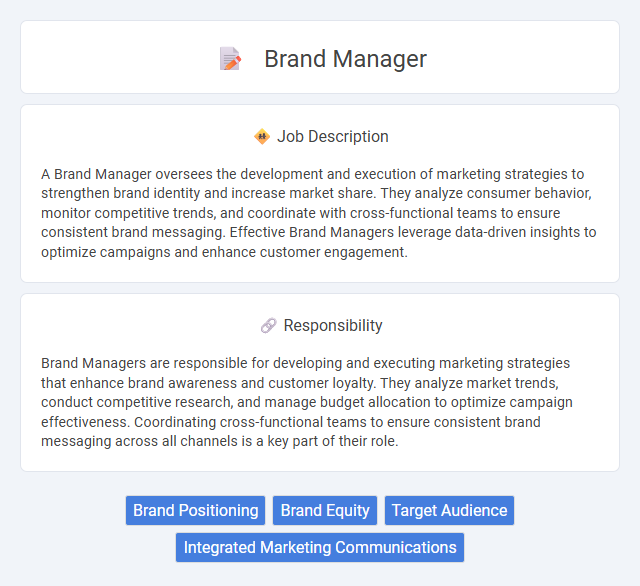
A Brand Manager oversees the development and execution of marketing strategies to strengthen brand identity and increase market share. They analyze consumer behavior, monitor competitive trends, and coordinate with cross-functional teams to ensure consistent brand messaging. Effective Brand Managers leverage data-driven insights to optimize campaigns and enhance customer engagement.
Individuals with strong communication skills and a creative mindset are likely to thrive as brand managers, given the need to develop compelling marketing strategies and collaborate across teams. Those who exhibit adaptability and resilience may be more suitable due to the fast-paced, deadline-driven nature of managing brand campaigns and responding to market changes. People who prefer routine tasks or limited interpersonal interaction might find this role less fitting, as it often requires dynamic problem-solving and stakeholder engagement.
Qualification
Brand Manager candidates must possess a bachelor's degree in marketing, business administration, or a related field, combined with at least 3-5 years of experience in brand management or product marketing. Strong skills in market research, consumer behavior analysis, and strategic planning are essential for driving brand growth and positioning. Proficiency in digital marketing tools, data analytics, and excellent communication abilities further enhance effectiveness in managing brand campaigns and cross-functional teams.
Responsibility
Brand Managers are responsible for developing and executing marketing strategies that enhance brand awareness and customer loyalty. They analyze market trends, conduct competitive research, and manage budget allocation to optimize campaign effectiveness. Coordinating cross-functional teams to ensure consistent brand messaging across all channels is a key part of their role.
Benefit
A Brand Manager likely enhances company visibility by strategically positioning products in competitive markets, increasing customer loyalty and market share. They probably drive revenue growth through effective brand campaigns and consistent messaging that resonate with target audiences. Success in this role may also lead to valuable cross-functional collaboration skills and opportunities for career advancement within marketing leadership.
Challenge
A Brand Manager faces the challenge of balancing creative innovation with market analytics to ensure brand growth and relevance. Navigating shifting consumer behaviors and competitive landscapes likely requires strategic adaptability and keen insight. Managing cross-functional teams to align brand messaging across platforms may also pose significant complexity.
Career Advancement
Brand Managers play a crucial role in developing and executing marketing strategies that enhance brand awareness and drive sales growth. Career advancement opportunities include progressing to senior brand management roles, marketing director positions, or chief marketing officer (CMO) roles, leveraging skills in leadership, market analysis, and cross-functional collaboration. Continuous professional development in digital marketing, data analytics, and consumer behavior can significantly accelerate upward mobility in this field.
Key Terms
Brand Positioning
Brand Managers play a crucial role in defining and maintaining strong brand positioning by analyzing market trends, competitor strategies, and consumer insights. They develop targeted marketing campaigns and messaging that align with the brand's core values and unique selling propositions to ensure differentiation in the marketplace. Effective brand positioning drives customer loyalty, enhances brand equity, and ultimately increases market share and profitability.
Brand Equity
Brand managers play a critical role in enhancing brand equity by strategically managing brand identity, customer perception, and market positioning. They utilize market research, competitive analysis, and targeted marketing campaigns to build strong brand loyalty and increase consumer trust. Effective brand equity management leads to higher brand value, increased customer lifetime value, and sustainable business growth.
Target Audience
A Brand Manager strategically defines and analyzes the target audience to create tailored marketing campaigns that resonate with specific consumer segments. Utilizing data-driven insights on demographics, psychographics, and consumer behavior, they enhance brand positioning and increase engagement. Their expertise ensures brand messaging aligns with audience preferences, driving loyalty and market growth.
Integrated Marketing Communications
A Brand Manager specializing in Integrated Marketing Communications orchestrates cohesive campaigns across digital, social, print, and broadcast media to ensure consistent brand messaging and enhance consumer engagement. Utilizing data analytics and market research, they refine targeting strategies and optimize the allocation of marketing budgets to maximize ROI. Collaboration with cross-functional teams, including product development and sales, enables seamless execution of multi-channel promotions that strengthen brand equity and drive revenue growth.
 kuljobs.com
kuljobs.com